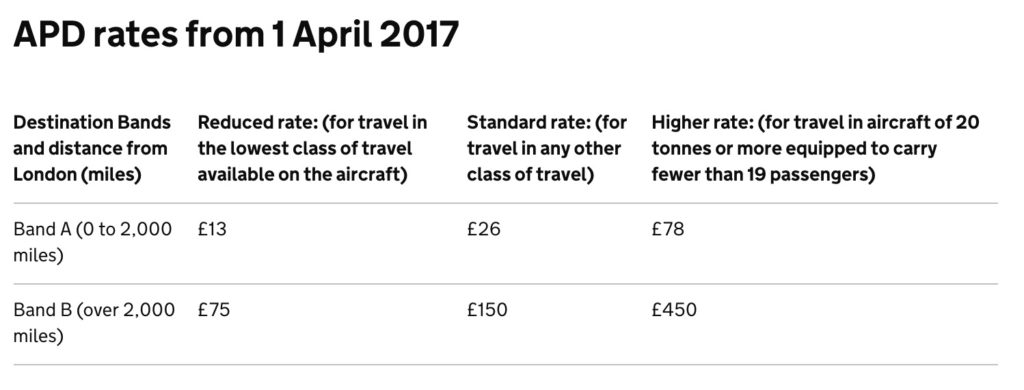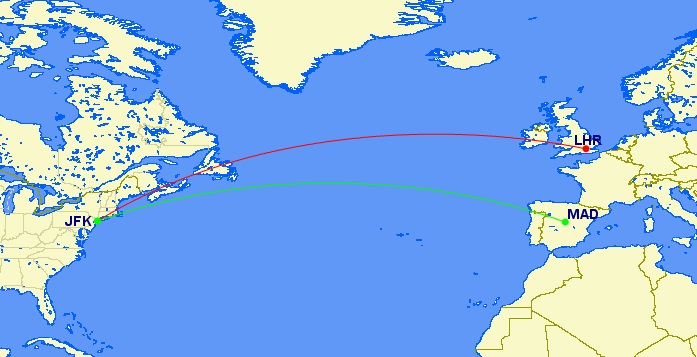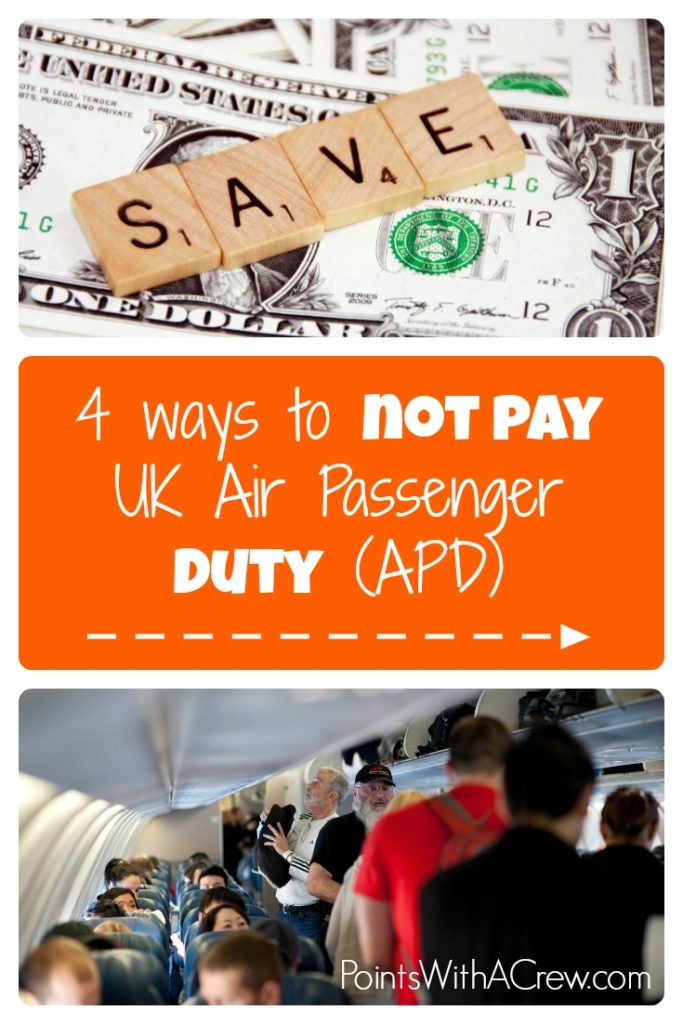(Last updated: March 2017)
The UK Air Passenger Duty (also known as APD) is a government tax that is levied on flights FROM the United Kingdom. It’s somewhat controversial, as there are several groups (including British Airways) within the UK who feel that it is unnecessary and a hurt to tourism. The rates for the UK Air Passenger Duty 2017 rates are as follows (from gov.uk)

The UK Air Passenger Duty rates for Band A (shorter flights) have remained the same for several years, but the Band B UK Air Passenger Duty cost has gone up by several pounds a year.
Before April of 2015, there were additional bands (for flights over 4,000 miles), but starting April 1st (no joke!) the UK Air Passenger Duty will be in 2 flights. Also note that until April 1st, the Band B APD is £69 /£138 (the Band A amount is staying the same).
So what are some ways that you can (legally!) avoid paying the UK Air Passenger Duty?

Spend less than 24 hours in the UK
If you spend less than 24 hours in the UK, then you are not charged the UK Air Passenger Duty. So if you are looking to avoid the UK APD, then you can make London a layover rather than a destination – you just need to make sure your flight the next day leaves less than 24 hours after you arrive.
Note that if you are flying into the UK on one airline / PNR, have a layover in London and then departing the UK on another airline, your second airline WILL charge you the UK Air Passenger Duty (because they don’t know anything about your only having been in the UK under 24 hours. I have heard reports that if you show that airline your inbound flight information that you can get the UK APD refunded. I’d love to hear others’ experiences with that.
Fly TO the UK, but depart elsewhere
Another option is to fly to the UK, but depart elsewhere.
If you’re flying roundtrip to the UK, you can avoid UK APD by taking an Open Jaw flight. One example would be below, where outbound you fly from New York to London, but your return goes from MADRID back to New York. You’re of course responsible for your own transportation between London and Madrid, and if you fly out of the UK, you will have to pay the UK Air Passenger Duty.
(SEE ALSO: Stopover, layover, open-jaw? What are they and what’s the difference?)
Another option is to use something like British Airways’ Reward Flight Saver, where many flights within Europe have a flat rate (currently $27.50 one-way) for UK Air Passenger Duty, fuel surchages and any other airport taxes.
Be under 16 years old
Starting on March 1 2016, the UK Air Passenger Duty is not collected on children who are 16 and under if they are traveling in the lowest class of service (generally Economy). If someone under 16 is flying in business class, the UK APD will be charged. If you booked a flight before then and were charged UK APD, you are eligible to have it refunded.
Currently UK Air Passenger Duty is not charged on infants under 2 years old who don’t have their own ticket (lap infants)
Leave from Northern Ireland
The rates for the UK Air Passenger Duty on direct long-haul flights departing from Northern Ireland are set by the Northern Ireland Assembly as of the Finance Act 2012, and they have currently set those rates to 0.
Currently, the only long-haul flight originating from Northern Ireland is a United Airlines flight going from Belfast (BFS) to Newark (EWR). If you connect via London, then you will pay the full UK Air Passenger Duty (even if you do not have a stopover)
Reduced UK Air Passenger Duty
The UK APD is less if you are in Economy Class (technically speaking, the “lowest class available on the airplane”, though there’s an exception for flights with no economy class – then everyone pays)
Air passenger duty is paid upon booking, but not collected until an occupied seat flies. If a passenger be unable to fly they have a right to claim the paid tax back from the airline, although many airlines will charge an administrative fee for this service.
Has this helped? Ever used one of these strategies to not pay the UK Air Passenger Duty?
This site is part of an affiliate sales network and receives compensation for sending traffic to partner sites, such as thepointsguy.com. This may impact how and where links appear on this site. Responses are not provided or commissioned by the bank advertiser. Some or all of the card offers that appear on the website are from advertisers and that compensation may impact on how and where card products appear on the site. Any opinions expressed in this post are my own, and have not been reviewed, approved, or endorsed by my advertising partners and I do not include all card companies, or all available card offers. Terms apply to American Express benefits and offers and other offers and benefits listed on this page. Enrollment may be required for select American Express benefits and offers. Visit americanexpress.com to learn more. Other links on this page may also pay me a commission - as always, thanks for your support if you use them









 Dan Miller travels with his wife and 6 (SIX!) children. He loves to help families travel for free / cheap, especially larger families. If you are looking for help, drop him an email at
Dan Miller travels with his wife and 6 (SIX!) children. He loves to help families travel for free / cheap, especially larger families. If you are looking for help, drop him an email at 
Not a bad attempt by a non-Brit 🙂
However, for clarity, to avoid APD on a layover (or when transiting in from Dublin) you MUST have just one ticket. Booking two separate tickets (Dublin to London, London to New York) means the London to NY attracts full APD.
Technically Inverness and other airlines in Scotland do not attract APD but that is a long way to go to avoid it! Jersey also avoids APD. The upside of Jersey is that BA treats it as UK so you can use a 241 voucher on BA routed Jersey London New York.
These strategies only make sense when leaving the UK in J, the Y APD is not high enough to be effective.
LOL. You know us Yanks – just gotta try 😀
Thanks for the clarification. Your first point (about needing to be on one ticket DUB-LHR-JFK) I thought that I mentioned but perhaps I didn’t make it clear. And you’re right that the economy APD prices aren’t that awful. I think when we head to the UK / Europe this fall, we plan on using Reward Flight Saver flights to mitigate the UK APD + airport taxes + fuel surcharges
I am booking an award ticket from JFK to FCO connecting in LHR (less than 7 hours). The fees the airline wants to charge is $ 265.00 +/-. Do I have to pay for that fee? LHR is not my final destination, nor will I be a transit passenger longer than 24 hours.
The short answer is… yes, you pretty much have to pay whatever the airline says if you want to book their ticket. In your case, that $265 may be a combination of a couple of different fees. $265 seems high for just the UK Air Passenger Duty for transiting, unless you’re flying first class. You ARE still subject to UK APD even transiting for 7 hours, but it should be at a reduced rate. You may be getting some other taxes and/or fuel surcharges. Feel free to email me at dan at pointswithacrew dot com with your specific route / what miles you’re using / etc. and I’m happy to try and help if I can
Since march 2016 children under 16 do not pay APD see here on KLM’s website https://www.klm.com/travel/gb_en/prepare_for_travel/at_the_airport/requirements/children_travelling.htm
Correct – I believe I mentioned that in the post?
In the article it has the old distinction of 12 not the new one of 16
Gotcha! Thanks for the correction and I have updated the post
I tried pushing BA after a flight from Dubai to USA via LHR, booked separately so I could get my 241 tkt. I even wrote to my MP but nothing back from anyone.
If you have a day to burn to get yourself to Dublin or Paris, it’s child’s play to avoid APD. You might want to call out these routes specifically because BA has very frequent connections DUB-LHR and CDG-LHR.
Sometimes you just have to take the hit, though. Pays for that third runway, right? 😀
Paying the huge taxes on flights through London are a budget buster. When we first visited Paris, we flew through Madrid to avoid these taxes. We saved $600 a person this way, which basically paid for the rest of the trip.